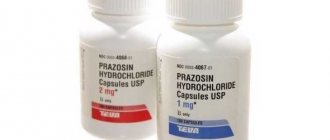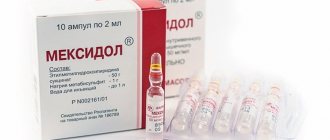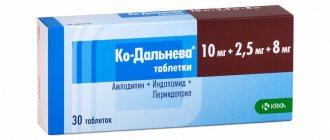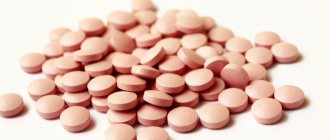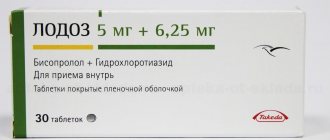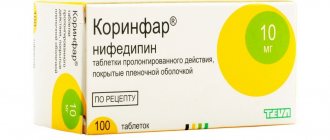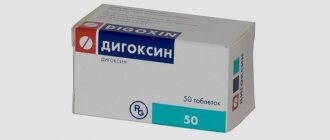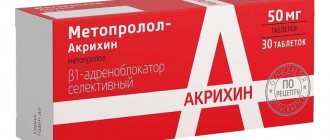In this article we will look at how to take Ascorutin to strengthen the walls of blood vessels.
It includes several drugs from different manufacturers that have the same composition. The formula of the drug includes two vitamins - C (ascorbic acid) and P (rutoside) in the amount of 59 milligrams. The drug is intended to strengthen the walls of blood vessels, reduce their permeability and minimize the likelihood of blood clots.
The drug is used for a large number of pathologies, including varicose veins. "Ascorutin" is produced in the form of small light yellow tablets. In pharmacies you can buy packages of thirty and fifty pieces.
Despite the fact that the drug is a vitamin complex, you should consult your doctor before starting use. We will tell you below how to take Ascorutin to strengthen the walls of blood vessels.
Vitamins for blood vessels
Vitamin C, that is, ascorbic acid, is not a key substance in the composition of the drug, although it is necessary in certain dosages for the normal functioning of the body. However, it does not produce a pronounced positive effect on the human vascular system.
The main element of “Ascorutin” for strengthening the walls of blood vessels, which has a beneficial effect on their condition, is rutin, or rutoside. It is one of the varieties of vitamin P.
Its main clinical functions are:
- decreased permeability of capillary walls;
- anti-inflammatory and antioxidant effects;
- reducing the fragility of small blood vessels;
- reducing platelet aggregation, thereby preventing the formation of blood clots.
It is worth noting that rutozoid is not found in nature in its pure form, but it is present in many foods.
The natural composition of the drug for strengthening blood vessels “Ascorutin” is for many people a significant advantage over other vitamin complexes of synthetic origin.
An important advantage of the medicine is its cost, which can vary depending on the manufacturing company and the number of tablets.
Despite its beneficial properties, the drug is not as effective in treating vascular pathologies when compared with synthetic rutoside derivatives. Of the derivatives, the most common drug is troxirutin, which has a pharmacological gel form. It is present in “Troxerutin” and “Troxevasin”. It is important to emphasize the fact that “Ascorutin” for strengthening the walls of blood vessels has a pharmacological effect only with regular use of the drug.
Expected effect
The drug is prescribed only in combination with other drugs. Ascorutin is recognized as a fairly effective remedy, which allows for an additional beneficial effect on the cardiovascular system, since the remedy:
- Restores the deficiency of not only ascorbic acid, but also nicotinic acid;
- Strengthens the walls of blood vessels, making them less brittle and fragile;
- Restores cellular humoral and local cellular immunity;
- Restores tissue trophism;
- Prevents or reduces swelling of the legs;
- Restores regenerative processes, has a slight antibacterial effect;
- Allows you to remove free radicals from the body.
The mechanism of influence of the components in the composition
Vitamin C is a key element for maintaining the normal functioning of connective tissues, and therefore can have a beneficial effect, including on blood vessels.
The functions of ascorbic acid in the body include:
This vitamin does not directly affect blood vessels, but its indirect participation and sometimes key role in a number of body processes in the absorption and reproduction of necessary beneficial elements contributes to their gradual healing and strengthening.
It is worth taking for veins and blood vessels only for the purpose of prevention. In advanced cases and when the pathology progresses, the drug will not show its effectiveness.
When rutoside (which is one of the bioflavonoids) and ascorbic acid is combined, a decrease in the activity of hyaluronidases, that is, enzymes that destroy hyaluronic acid compounds, is achieved. Thanks to the combination of these vitamins, microcirculatory vessels are strengthened, and their fragility level is noticeably reduced.
There are a lot of reviews about “Ascorutin” for strengthening blood vessels.
Side effects
Due to its high tolerance by the body, almost any patient can take ascorutin for varicose veins, with the exceptions mentioned above.
However, in rare cases, the occurrence of side effects is still possible; they are expressed by the following symptoms:
- Central nervous system: headaches, night sleep dysfunction, rapid onset of fatigue, overly excited nervous state.
- Blood circulation: increased levels of platelets and red blood cells, the appearance of symptoms of hyperthrombinemia and neutrophilic leukocytosis.
- Cardiovascular system: symptoms of hypertension, pathological disorders in the heart muscle, tissue trophic disorders.
- Metabolic processes of the body: malfunctions of the pancreas, expressed in the form of diseases such as hyperglycemia, glycosuria, excess vitamin C.
- Gastrointestinal tract: urge to vomit, signs of nausea, pain in the stomach and intestines against the background of disruption of the normal state of the mucous membrane of these organs.
- Allergic reactions: swelling of the larynx, rash and redness on the surface of the skin, itching sensation.
Indications for use
The drug, like other pharmacological agents, has a clearly established list of indications for use and includes the following conditions:
The drug is often recommended for people who suffer from vascular diseases.
It is important to know that the medicine is also used in cosmetic medicine and to strengthen small blood vessels, whose fragility causes rosacea, that is, spider veins.
Despite the non-synthetic origin of the components, the product has some contraindications. Before use, you must study the instructions and become familiar with all the features of the drug.
How to properly take Ascorutin for blood vessels is described in the instructions.
Contraindications
There are not many reasons to refuse medication. The name is considered relatively safe if you adhere to a competent application regimen.
In any case, it is not recommended to drink Ascorutin on your own; it can cause side effects: from allergies to hypervitaminosis.
The list indicated by the manufacturer himself in the instructions:
- Individual intolerance to vitamins C or P. Exogenous substances are always perceived by the body, relatively speaking, with caution. There is a high probability of an immune response to the components of the drug. Vitamins cause allergies even more often.
If the history does not say anything about intolerance, it makes sense to take Ascorutin in small dosages to assess the individual effect. Only in the absence of a response can one switch to the recommended concentration.
- Diabetes. Due to the tendency to influence the background of hormones along the chain.
- Thrombophlebitis. It is possible to use Ascorutin as part of the prevention of this. But when the disease has become a proven fact, you should stop taking it. There is a high probability of a blood clot breaking off, increasing in size, and migrating throughout the body. Which will most likely be fatal for a person.
- Decompensated renal failure. Since drug metabolites are excreted in the urine. The main load falls on this paired organ. If the functioning is insufficient, intoxication will occur on the one hand, and on the other hand, the situation with the kidneys will become even worse.
- Metabolic diseases: including gout. Even in remission.
- Pregnancy in the first trimester. There is a risk of negative effects on the fetus through the placental barrier.
- Childhood. Asporutin is not allowed to be taken until the patient reaches 4 years of age.
- Also, you should not take the drug if you have severe bleeding disorders. Increased or decreased.
- Polyvalent allergic reaction to drugs. It is quite rare. The bottom line is intolerance to multiple medications at once.
It is difficult to predict in advance which medications will respond. Cross-allergic reactions must be taken into account.
So, if there is a history of intolerance to B vitamins, it is possible that the same will happen with other substances of this type. C and P is no exception.
Attention:
Contraindications are absolute; for these diagnoses and conditions, Ascorutin cannot be taken.
Who should not use the drug?
The abstract contains a list of conditions for which it is undesirable to take this drug. These include the following conditions:
The latter condition is quite rare, but its possibility cannot be ruled out. There are also the following cases that prevent the use of the drug "Ascorutin":
It is not advisable to use a complex of vitamins without a direct prescription from a specialist, despite the fact that the medicine is among the over-the-counter ones. A medical consultation is needed to determine the dosage acceptable for each patient, which will have the most positive effect on his body.
It should be noted that the doctor determines privately the frequency, dosage and duration of use of the drug.
Many people are interested in how to take Ascorutin to strengthen the walls of blood vessels.
Analogs
According to the angioprotective effect of Ascorutin, the following analogues can be distinguished:
- Anavenol
- Angiovitis
- Venarus
- Ginkor fort
- Detralex
- Cyclo 3
- Aescusan
- Troxevasin ointment
Price
The average cost of this medicine in Moscow pharmacies is as follows:
- Ascorutin No. 10 – 20-25 rub.
- Ascorutin No. 50 – 50-100 rub.
Interaction with other drugs
Ascorutin can reduce the effectiveness of sulfonamides, for example, Biseptol, and aminoglycosides, for example, Gentamicin.
- Reduces the effectiveness of heparin.
- Increases the side effects of salicylates.
- When taking oral contraceptives and acetylsalicylic acid, the absorption of vitamin C is reduced.
- When taking low doses of ascorbic acid and B vitamins, an enhanced therapeutic effect is observed.
- If Ascorutin is taken for more than a month, then taking cardiac glycosides, antihypertensives or NPPs (non-steroidal anti-inflammatory drugs) should be postponed.
Ascorutin and nicotinic acid
The use of these drugs is permitted because they can enhance each other's effects.
Ascorutin and alcohol, compatibility
Drinking alcohol does not affect the therapeutic properties of this drug, but alcohol has an adverse effect on organs and tissues.
This may subsequently cause side effects of this drug. Therefore, taking Ascorutin in combination with alcohol is not recommended!
Using the complex to strengthen the walls of blood vessels
The components of the drug have a positive effect on the condition of blood vessels, reducing their susceptibility to negative influences and fragility. The vascular walls are strengthened, while inflammation processes are stopped and swelling is reduced. The drug "Ascorutin" is used to correct defects in the hemodynamics of veins.
It is not capable of repairing damage, but can produce angioprotective effects. But this drug is a short-term medication. During what period can you take Ascorutin to strengthen the vascular walls? The doctor will give you the exact answer. The instructions allow its use for no more than 2-3 weeks.
When using the drug as a remedy for varicose veins, a person can count on such improvements as a decrease in the likelihood of blood clots and a decrease in the severity of symptoms of vascular pathologies due to lower permeability of the walls (thus, swelling is eliminated). The best option is to combine the drug with other drugs, which will slow down the progression of vein pathology and eliminate complications.
So, how to take Ascorutin to strengthen the walls of blood vessels?
Benefits of using the drug
The use of the drug in complex therapy for the treatment of varicose veins has become beneficial because the drug:
- Offered at a meager price. This is a time-tested vitamin complex, the cost of which remains low;
- Complex effect on the body. The composition carried throughout the body strengthens the walls of all blood vessels, strengthens the cardiovascular system, and helps prevent diseases such as thrombophlebitis, rosacea, varicocele, and varicose veins;
- Safety - the composition is as simple as possible, it can be taken even during pregnancy (starting from the second trimester), as well as while breastfeeding. The drug is well tolerated by almost all patients;
- Ease of use - the scheme is quite simple; Ascorutin can be used both for the treatment of an illness and for its prevention.
Instructions for use of the drug
The instructions do not regulate the dosage of the medicine when it comes to the treatment of varicose veins, since the main purpose of the complex is different. However, the method of administration for vascular diseases does not differ from the standard method.
"Ascorutin" should be taken orally, since the active substances are well absorbed through the gastrointestinal tract. Its dosage is determined individually - depending on the age group, needs and physical parameters of the patient.
How much to drink “Ascorutin” to strengthen the walls of blood vessels? On average, the course of therapy is 7-14 days.
The medicine is taken after meals - the tablet must be washed down with clean, non-carbonated water in sufficient quantities. It is not recommended to chew them, as ascorbic acid is released, which can harm tooth enamel.
It is important that it is forbidden to take the tablets with mineral or carbonated water, since ascorbic acid can be neutralized.
“Ascorutin” for the treatment of varicose veins must be combined with another drug, mainly containing escin or diosmin. These drugs are also included in the list of oral medications. The greatest positive effect can be achieved if you combine these drugs with local medications - gels, ointments, compression garments.
During therapy with other medications, you should consult your doctor, since ascorbic acid and rutin may react with some medications, for example:
In addition, you need to remember that the drug can cause negative effects during treatment.
It is important to find out in advance how to drink Ascorutin for blood vessels.
Question answer
- Will Ascorutin help with heavy periods?
Answer: yes, it will help. But if heavy periods are the result of a hormonal imbalance, then it is necessary to take hormonal medications in combination.
- How much to take Ascorutin for varicose veins?
Answer: This drug for varicose veins must be taken in combination with other drugs for a month. The course of treatment mainly depends on the severity of the disease.
- What is Ascorutin used for?
Answer: the drug is indicated:
- For vitamin deficiency, vitamin C deficiency and rutin.
- For varicose veins.
- For spider veins on the face.
- For venous insufficiency.
- For the prevention of varicose veins.
- For the prevention of influenza and acute respiratory infections.
- How to take Ascorutin correctly - dissolve or drink?
Answer: the drug must be taken with plenty of water. It is not recommended to dissolve, since vitamin C (the active component) can cause damage to tooth enamel.
- Does this drug help veins?
Answer: Yes, this drug is effective in treating venous insufficiency.
- How long should I take it if I have heavy periods?
Answer: if you have heavy periods, you should take the drug for 10 days. A doctor's consultation is required before use.
- At what age is Ascorutin allowed?
Answer: the drug is indicated from three years of age.
- Does Ascorutin thicken the blood or not?
Answer: the drug thickens the blood, but long-term use can cause the opposite effect.
- Is it possible to take Ascorutin to thin the blood?
Answer: no, the drug thickens the blood, but long-term use causes it to thin out.
- Does Ascorutin increase blood pressure?
Answer: the drug can cause an increase in blood pressure as a result of an overdose or side effect.
- Can the drug cause a delay in menstruation?
Answer: with long-term use, as well as with large doses of the drug, Ascorutin can cause menstrual irregularities, in the form of a delay in menstruation.
- Can I take the drug if I have high hemoglobin?
Answer: taking it is not advisable, since ascorbic acid promotes better absorption of iron, increasing hemoglobin. But with long-term use of Ascorutin, a decrease in the level of hemoglobin in the blood is possible.
- Is it normal to have a taste in the mouth after taking Ascorutin?
Answer: yes, that's normal. Vitamin C causes a slight sour taste.
- Detralex and Ascorutin, can you take them together?
Answer: yes, you can. But only after a doctor's prescription. Detralex in combination with Ascorutin will have a complex effect on blood vessels, which will significantly ease the course of varicose veins.
- Are Ascorutin and Troxerutin taken together?
Answer: yes, such a combination is possible, but only after consultation with a doctor.
Side effects
Possible side effects due to taking a vitamin complex include:
General violations can be expressed as:
Everyone should know how to drink Ascorutin to strengthen the walls of blood vessels.
Please note that if adverse symptoms occur, you should consult a doctor. If there is a particular sensitivity to the composition, the use of the drug should be discontinued.
Possible disorders of the digestive tract may be the following: attacks of nausea; diarrhea; gagging.
When an allergic reaction occurs as a side effect, it is predominantly expressed as hives. All negative symptoms when using the complex most often occur when the dosage prescribed by the doctor is exceeded. In this case, you need to take an antihistamine and consult an allergist for help.
This is what it says in the instructions for the drug “Ascorutin” for strengthening blood vessels.
Reviews
Tamila writes: “I took Ascorutin for hemorrhoids.
Helped a lot." Natalya writes: “I take Ascorutin to strengthen blood vessels. Sometimes capillaries are visible in the eyes. I take it strictly according to the instructions for two weeks. I already saw results after a week of taking it. My eyes stopped being red and began to look fresh and rested.”
Victoria writes : “I have varicose veins in the initial form, on my left leg. I started taking Troxevasin ointment and Ascorutin. In addition, I do foot baths and changed my diet. I am very pleased with the result. The disease began to recede. I’ve been taking it for about a month.”
Tatyana writes : “I have rosacea on my face. They advised me to take Ascorutin. I started drinking, but there is no result yet, I’ve been drinking for more than two weeks.”
ps recommended reading: Varicobooster cream for varicose veins and cream of varicose veins price
More about varicose veins (video)
Alternative ways to use the complex
Alternative methods of using the drug can eliminate the symptoms of rosacea. It can be used as an independent ingredient in a variety of masks and tonics. The most common remedy is a tonic based on chamomile infusion.
Four tablets should be dissolved in a chilled, ready-made chamomile infusion (one liter) from a pharmacy. It should be used when washing, carefully wiping the problem area with a cotton pad.
A mask based on white clay is also effective. To make it, you need to dilute the clay with milk or green tea, and add three tablets of the drug to the resulting mixture. Apply a thick layer to the area with rosacea, then leave on the face for 30 to 40 minutes. Rinse off with cold water. Then you can consolidate the result with chamomile tonic, which will reduce the severity of rosacea in a shorter period of time.
To get the maximum effect from the product, you need to avoid using alkaline liquids during treatment. It is also recommended to reduce the amount of fruits and vegetables, as they reduce the body's ability to absorb ascorbic acid.
"Ascorutin" is a drug with a wide range of effects, but more often it is used as an immunostimulating agent. The medication is quite safe, but it has a rather powerful effect that can help with a number of vascular disorders, especially with defects in microvascular circulation.
The drug strengthens blood vessels and eliminates their increased fragility. But it is not advisable to decide on your own whether you need to take it, or calculate the dosage.
Useful tips
Ascorutin is a drug that is used in complex therapy for the treatment of varicose veins. It can be used by both elderly and young people. The drug is often included in the treatment regimen for pregnant women, but in any of these cases you must strictly adhere to the dosage and follow the advice of doctors. Self-medication is not allowed.
To make the effect of treatment even more pronounced, you should listen to the following advice:
- Spend more time outdoors. Walking promotes excellent blood circulation. Doctors advise spending at least 45 minutes a day on an active walk;
- Go to the gym - due to age, the loads may be small, but they will also improve the quality of life, reduce swelling and pain in the legs;
- Drink enough water. An adult needs about 1.5–2.5 liters of fluid per day (depending on weight);
- Forget about bad habits, as well as fatty foods. Doctors recommend taking a blood test for cholesterol at least once a year, and depending on the results obtained, adjusting your menu.
Strictly following the advice of your own doctor, as well as the instructions for the drug, will guarantee, if not a complete recovery, then at least eliminate the development of the disease and its unpleasant consequences.
Analogues of "Ascorutin" for strengthening blood vessels
The vitamin complex has the following foreign analogues:
“Askorutin” also has domestic analogues: “Askorutin-UBF”; "Ascorutin-D"; "Venarus"; "Angiovit"; "Profilaktin S" and others.
Active Ingredients
The use of the drug ascorutin for varicose veins significantly accelerates the process of regeneration of vascular and capillary tissues due to the presence of the following valuable substances in its composition:
- Vitamin C, also called ascorbic acid.
- Vitamin P, commonly referred to as rutin.
- Calcium.
- Auxiliary components such as starch, sucrose and talc.
Ascorbic acid for varicose veins has a complex therapeutic effect:
- By protecting tissues from radical breakdown, it prevents oxidation and destruction of the walls of veins and adjacent muscles, tendons and epithelium.
- It has a regenerating effect on blood vessels and tissues.
- Prevents excessive blood thickening, normalizes venous and capillary blood flow.
- Helps increase immunity and strengthen the body's immune system.
Vitamin P is no less useful for varicose veins; the specificity of its therapeutic effect is as follows:
- The tissues of the venous and capillary walls thicken.
- Swelling of the calf area, inflammation of the veins in the legs and soft tissues are stopped and eliminated.
- Blood circulation inside small capillaries returns to normal.
List of foods that strengthen vascular walls
Not only for the vascular walls, but also to strengthen the body as a whole, you need to adhere to a competent diet. The diet should be balanced in its main components: carbohydrates, fats and proteins, vitamins and minerals. It is advisable to remove fast food, fatty foods, and all dishes prepared with large amounts of vegetable oil from the diet. Sweets, that is, easily digestible carbohydrates, also cannot be considered healthy; it is advisable to replace them with plant sugars - fruits, honey, sweet vegetables. Fruits and vegetables rich in vitamins that strengthen vascular walls deserve special attention; they should be consumed raw, if possible. Among the healthy products, we can especially highlight dried fruits, fruits and raspberries, milk porridge (especially oatmeal, only without adding oil), various types of vegetable oils that are not subject to heat treatment, lean chicken or beef; fish.
You also need to pay attention to your drinking regime; you need to drink at least one and a half liters of liquid a day, for example, filtered clean water without adding gas, hawthorn or rose hip decoction, green tea with milk.
We looked at how to drink Ascorutin to treat blood vessels.
How to take it correctly?
The dosage of the drug and the duration of therapy directly depend on the disease that the doctor intends to cure. Ascorutin is also prescribed as maintenance therapy and for the prevention of vascular pathology.
How to take Ascorutin for varicose veins?
Ascorutin for varicose veins must be taken in small courses of two weeks with breaks of 10 days. The dosage depends on the condition of the veins; on average, you need to take 2 or 3 tablets every 12 hours (you can do it in the morning and evening). Considering that the drug can stimulate the production of gastric juice, the tablets are taken after meals.
Ascorutin for varicose veins must be taken in small courses of two weeks with breaks of 10 days
For the treatment of varicocele, Ascorutin is taken in one course every 25-30 days. Every day you need to drink 2 tablets 2 times a day. If treatment does not bring the desired result, the dosage can be increased to three tablets twice a day.
It is very important to observe the number of tablets, the maximum dose is 10 tablets per day, if it is exceeded, side effects may occur.
If Ascorutin is taken for the purpose of correcting the condition of varicose veins or for prevention, then the dosage should be the same as for the treatment of varicose veins. The effect should occur no earlier than 20 days after the start of treatment.
Remember to pause between doses, as the body may develop resistance to the drug.
Many people have a question whether it is possible to drink Ascorutin for stage 3 varicose veins. With advanced varicose veins, you should think about surgical treatment, and take the drug with maintenance therapy.
Ascorutin is a low-toxic drug that rarely causes allergies.
Description of the drug Askorutin
Ascorutin is a vitamin preparation that is aimed at preventing deficiency of P and C. Why take such tablets, in addition to deficiency, will tell you the list of indications in the instructions from the manufacturer ZAO Altaivitamins.
In medicine, this remedy belongs to the group of natural bioflavonoids; it is also considered a capillary-stabilizing drug for strengthening the walls of blood vessels. The prescription of the medicine is carried out only by the attending physician, despite the natural composition.
The fact is that the drug has a broad effect and is used in several areas of medicine at once:
- in cardiology (for the heart, for diseases of the blood and blood vessels);
- in gynecology (with bleeding or smearing with blood, during breastfeeding, etc.);
- pediatrics (for colds, low immunity and vitamin deficiency);
- dermatology (to treat skin infections);
- oncology (with radiation therapy);
- in cosmetology (for the skin, its beauty and healthy appearance);
- in dentistry (for gum treatment);
- in bodybuilding (to increase endurance).
Also, in some cases, doctors prescribe Ascorutin for the prevention of colds. Since the tablets strengthen the immune system, as well as in complex treatment of allergies.
Having decided what the vitamin preparation is needed for and in what areas of medicine, the instructions and the attending physician specify the method of use.
Ascorutin during pregnancy and breastfeeding
If a woman is carrying a child, taking Ascorutin is quite likely. For the prevention of viral, colds and infectious diseases by increasing immunity.
The composition will help cope with lacrimation and runny nose, will have an antioxidant effect, and will also improve oxygen supply and blood circulation throughout the body.
In gynecology, this drug is prescribed to pregnant women for the purpose of:
- prevent varicose veins;
- strengthen the vascular wall;
- prevent bleeding;
- prevent the development of hypoxia.
You can take Ascorutin only from the 2nd trimester of pregnancy and only as prescribed by a gynecologist.
But during breastfeeding, such a remedy is not always appropriate. Since for a newborn, vitamin C can cause an allergic reaction.
Pregnancy and breastfeeding are relative contraindications. Application during this period is justified only if the need prevails over the possible risks.
Ascorutin: composition, application
Its indications, pharmacological features, rules of use and contraindications directly depend on what is included in the tablets.
If we consider the vitamin remedy Ascorutin, the composition of the drug contains 2 active substances - ascorbic acid, also known as vitamin C, and also rutin, that is, vitamin P.
The main substances in one tablet are contained in a dose of 0.05 g. Today, the manufacturer offers three release forms:
- Ascorutin radar.
- Askorutin Ka.
- Askorutin D.
In the first and last case, the dosage of the main components is 100 mg, in the second form - 3 g.
For reference! Since the main active ingredients of Ascorutin are vitamins, the price for it will be low.
In different pharmacies, the price of tablets may vary slightly. On average, the price for 50 tablets is 35-40 rubles. to Askorutin, 75-80 rubles. on Askorutin Ka, 40-50 rubles. on Askorutin D
Ascorbic acid is often bought for children. They are consumed primarily if the body is weakened and tired.
The ability of vitamin C to strengthen the immune system allows you to fight many colds. Ascorbic acid also helps to normalize many biochemical processes in the human body.
Flavonoids are known for helping blood vessels become flexible and elastic. The vitamin also normalizes heart rhythm and normalizes blood pressure.
The combination of these components can restore many important processes in the body, strengthen blood vessels (especially capillaries), and the product is also an available antioxidant.
The composition of the drug Ascorutin includes active components - ascorbic acid and rutin. The drug also contains auxiliary ingredients and is available in tablet form for oral administration.
Pharmacological effect
The therapeutic effect is achieved due to the combined action of the active components of the drug. The drug is one of the strongest representatives of antioxidants. It prevents cell destruction by blocking peroxide oxidation of the lipid layer of their membranes. Shows angioprotective effect, strengthens the walls of blood vessels and helps normalize their permeability.
Participates in the exchange of heme and folic acid, regulates blood clotting and prevents the development of hemorrhages. Taking ascorbic acid helps prevent colds. Increases the effectiveness of the immune response and makes the body more resistant to infections. The product is included in the complex treatment of allergies.
It also exhibits anti-inflammatory properties. Takes part in the production of stress hormones and is a good remedy for dealing with stressful situations. It is used in cosmetology as it participates in the production of collagen, which is responsible for the elasticity and youth of the skin. Recent studies prove the therapeutic and preventive role of the drug in the fight against cancer.
